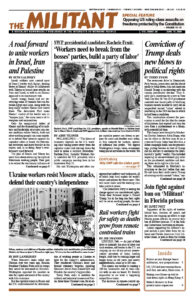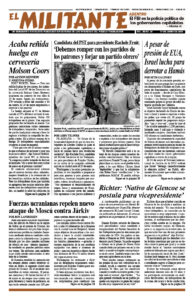Supporters of the rights of workers behind bars, freedom of speech and the press are stepping up efforts to urge Florida prison officials to reverse their ban of Militant issue no. 17 at the Jackson Correctional Institution in Malone.
Letters supporting the Militant’s appeal include a joint letter from the national and Florida American Civil Liberties Union, as well as from the Florida Press Association, which has 146 member newspapers across the state, including the Miami Herald and Orlando Sentinel.
On April 29 prison officials at Jackson Correctional Institution sent an impoundment notice to the Militant saying that the issue (1) “depicts, describes or encourages activities that may lead to the use of physical violence on another person”; (2) “is dangerously inflammatory in that it advocates or encourages riot, insurrection, rebellion, organized prison protest”; and (3) “includes signs, symbols” that “promotes the gang culture or lifestyle.”
The ban cites a photo on page 7 of the issue: “Picture shows dead person being paraded around on a motorcycle; Magazine depicts hatred toward a specific race.”
In fact, the photo portrays, as the caption underneath it says, “Hamas parades Jewish man murdered by death squad Oct. 7 past cheering supporters in Gaza City. Massacre in southern Israel was deadliest single attack on Jews since Hitler’s ‘Final Solution.’”
The Militant used the photo as one illustration in a feature reprinting a chapter from a new book by Pathfinder Press, The Fight Against Jew-Hatred and Pogroms in the Imperialist Epoch: Stakes for the International Working Class.
The picture was taken by an Associated Press photographer and has appeared widely in news media in the U.S. and worldwide, including the Boston Herald, U.S. News and World Report and Proceso in Mexico.
“The ACLU Foundation and the ACLU of Florida write to request that you reverse” the impoundment, Corene Kendrick, deputy director of the ACLU National Prison Project, and Daniel Tilley of the ACLU of Florida wrote to the Literature Review Committee May 31.
“Unfortunately, this is not the first time such bans and impoundment have arisen with this publication,” they wrote. “We have contacted FDC about improper censorship of the Militant multiple times before, as recently as last year.”
Their letter includes a copy not only of the photo from Gaza City, but a picture the Militant ran with it of a Jewish family in Belostok, in what is now Poland, after czarist-inspired pogromists murdered 80 Jews there in 1906.
Impoundment ‘is unconstitutional’
“The article specifically details the long fight against anti-Semitism, condemns Hamas for its October 7 assault, and sets it in the broader historic context of attacks on people of Jewish faith,” they write. “In sum, the impoundment and confiscation of the Militant — a publication in print for half a century that is widely read in prisons — is unconstitutional.”
Samuel Morley, general counsel for the Florida Press Association, wrote May 30 to protest the ban. “The photo was part of an article on the fight against Jew-hatred and against Hamas’ use of the Palestinian civilians of Gaza as human shields. The article repeatedly and unequivocally condemns Hamas for its murderous October assault,” he said.
A letter sent to the Literature Review Committee from Inna Stavitsky, former president of the Holocaust Memorial Committee of Brooklyn, reads “The Militant is a newspaper that, in its every issue, stands for tolerance and condemnation of barbaric terrorism.”
“In March 2024, journalists from the Militant visited The Holocaust Memorial Park in Brooklyn, NY, which is dedicated to the memory of the victims of Nazism irrespective of their ethnicity, religion or national belonging,” she wrote. “I see the decision to ban the issue of the Militant as a violation of the First Amendment rights of both the prisoners and the publication.”
The Militant appealed the impoundment May 23. David Goldstein, the Militant’s lawyer and member of the prominent civil liberties law firm Rabinowitz, Boudin, Standard, Krinsky and Lieberman, wrote that the ban is “fundamentally incomprehensible. It cannot possibly be that it is the position of FDOC that condemnation of Hamas’ barbarity, including photographic depictions condemning that barbarity, is prohibited.”
He asks whether prison authorities have “singled out the Militant for some reason? Its support for Israel as a refuge for Jews and its unconditional condemnation of Hamas and the regime in Iran?”
Goldstein notes, “The Militant is currently mailed to 284 inmate subscribers in 29 states at 139 state, federal and municipal prisons, including 117 inmates in 28 state prisons in Florida.” No other prison “found anything in this issue to constitute a threat to prison security.”
“Our fight is not just for the Militant. We defend the right to free speech for everyone,” Militant editor John Studer said, urging readers to help get support for overturning the ban. “Because we have become known as determined and effective fighters for political rights is one of the reasons we get so much support.
“We are convinced prisoners have the right to read material of their choosing, to think for themselves, to form their own opinions, to follow unfolding class-struggle battles worldwide,” he said.
Letters can be emailed to Saritza.Legault@fdc.myflorida.com or sent to the Florida Department of Corrections, Literature Review Committee, 501 South Calhoun St., Tallahassee, FL 32399-2500, with copies to themilitant@mac.com.

